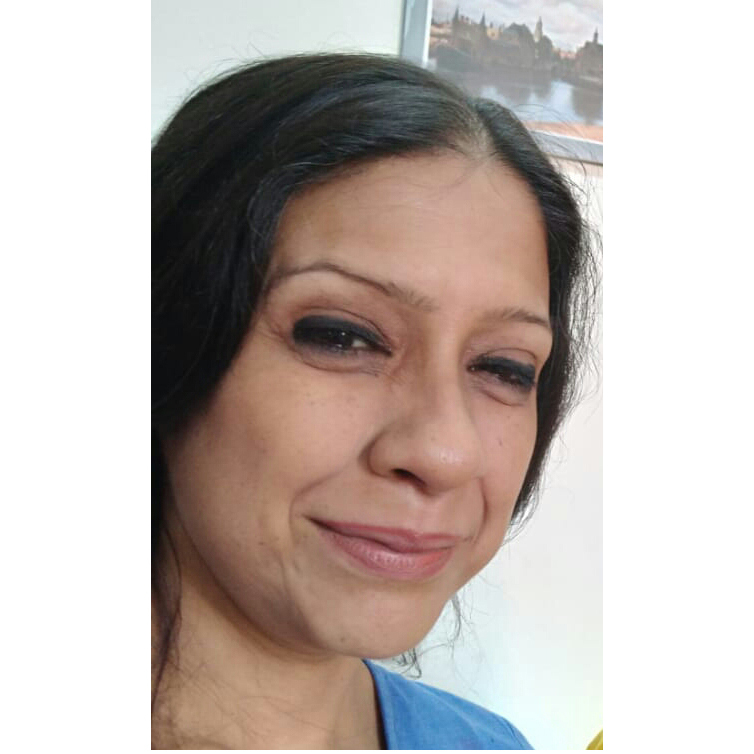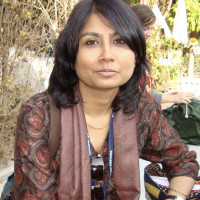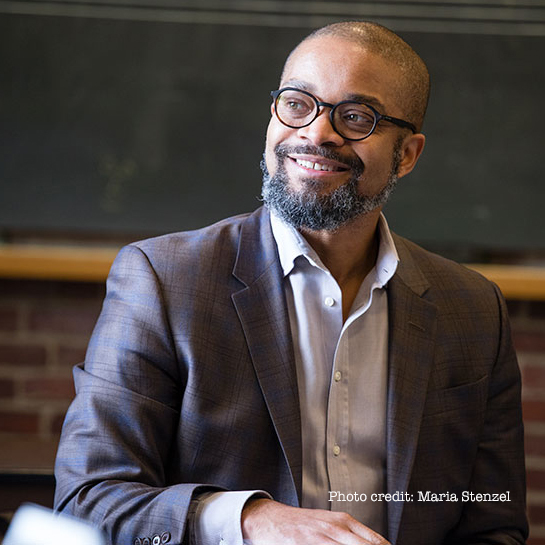CHCI International Advisory Board Welcomes Four New Board Members
Earlier this year, CHCI welcomed new members to the International Advisory Board:
- Nadia Al-Bagdadi, Institute for Advanced Study, Central European University, Hungary
- Prathama Banerjee, Centre for the Study of Developing Societies, New Delhi, India
- Rosinka Chaudhuri, Centre for Studies in Social Sciences, Calcutta, India
- Darryl Harper, Center for Humanistic Inquiry, Amherst College, U.S.A
These new members are affiliated with a variety of institutions, researchers in a number of global regions, and leaders in various scholarly fields. Nadia Al-Bagdadi is a historian of modern Islamic history, thought, literature and culture with a particularly focus on Arab nineteenth-century history.
We are thrilled to welcome two new board members from India. Prathama Banerjee and Rosinka Chaudhuri were part of the two-day symposium, "The State of the Arts and the Humanities in India," organized in conjunction with the board meeting held in Delhi in December 2019. Through their services on the IAB, we look forward to learning more about and connecting with arts and humanities organizations in the global south.
In addition to scholarly expertise and the perspective of the liberal arts college, Darryl Harper brings to the CHCI board a background in the performing arts: a vital part of humanities centers and institutions around the world and programming of many CHCI member organizations.
Along with these new board members, Amanda Anderson and Jean Allman were re-elected to the International Advisory Board for another term.
These new members of the CHCI International Advisory Board were selected both for their individual qualifications and the need for intellectual, regional, and institutional representation within the Consortium. We look forward to their intellectual leadership in emerging opportunities for international collaborations and addressing major issues of public concern in the 21st century.
---

Nadia Al-Baghdadi
Al-Baghdadi's research interests are deeply anchored in Arab nineteenth century history and its place in universal, or in today’s terms, in global history. Initially starting with a study on cultural and intellectual transformations in Egypt as expressed in the emergence of new genres of writings and the nahda movement (the Arab Renaissance), she moved towards examining in-depth the various actors, structures and relationships of what she calls Late Ottoman Modernity and Muslim Reformism in the Arab East. Two intertwined streams of research have since marked my work and fascination with this history, the tension between the secular and religious as it manifests itself in the formation of new socio-cultural and intellectual trajectories and the late emergence of print culture and its Eastern Mediterranean specificities. Her current book project follows these two developments through the lenses of the life and thought of the polymath, writer and printer Faris Ahmad al-Shidyaq (to appear with Edinburgh UP). Another project that emerged out of these studies during the last years tries to re-locate the entangled connections of European and Arab borders of faith and the role of religion, scholarship and modernity between Europe and the Eastern Mediterranean. Although in no direct connection with these researches of mine, over the years she has also published on gender-related issues, from my very first publication, an Introduction to a volume on Iraqi female exiles, on to a more recent chapter on the emergence of new moral and sexual taboos during the mid-nineteenth century. Instigated by a brief book she wrote on Arabic erotological literature, she is trying to deal more systematically with the question of gender, religion and modernity in the nineteenth-century Middle East.
---

Prathama Banerjee
Banerjee leads the humanities division of the Center for the Study of Developing Societies. She is a historian, trained at Jawaharlal Nehru University, New Delhi and the School of Oriental and African Studies, University of London. She works at the cusp of the philosophical and the literary, the interface which she argues historically produced traditions of political thinking in the global South. Her recent book Elementary Aspects of the Political: Histories from the Global South (Duke University Press, 2020) studies the rise of modern politics in south Asia in the encounter between colonial modern, classical Indian, Indo-Persian and regional vernacular ideas. It unpacks the modern conception of the political into four elementary aspects – Self, Action, Idea and People – and shows how each so-called element is structured around a conceptual instability, rendering its very elementary status questionable. Banerjee’s earlier work was on the Politics of Time (Oxford University Press, 2006) in which she looked at the emergence of the modern discipline of history in colonial Bengal out of an encounter with ‘peoples without history’, in diverse discursive and material sites, such as that of calendrical reform, history and geography textbooks, travel literature, anthropology, poetry, indentured labor markets and agrarian credit markets. Banerjee is currently involved in two projects – the first a long history of political concepts in south Asia cutting across the classical, medieval and modern periods and the second a collaborative thinking about democracy and its frontiers in the contemporary digital-viral age.
---

Rosinka Chaudhuri
Rosinka Chaudhuri (D.Phil. Oxon) is Director and Professor of Cultural Studies at the Centre for Studies in Social Sciences, Calcutta (CSSSC). She was inaugural Mellon Professor of the Global South at Oxford University, 2017-18, and has held visiting positions at King’s College, London, Delhi University, Cambridge University and Columbia University. Her books include Gentlemen Poets in Colonial Bengal: Emergent Nationalism and the Orientalist Project (Seagull: 2002), Freedom and Beef-Steaks: Colonial Calcutta Culture (Orient Blackswan: 2012) and The Literary Thing: History, Poetry and the Making of a Modern Cultural Sphere (Oxford University Press: 2013, Peter Lang: 2014). She has edited: Derozio, Poet of India: A Definitive Edition (Oxford University Press, 2008), The Indian Postcolonial (with Elleke Boehmer, Routledge UK, 2010), A History of Indian Poetry in English (Cambridge University Press, 2016), An Acre of Green Grass and Other English Writings of Buddhadeva Bose (Oxford University Press, 2018), and a series titled Social Science Across Disciplines (co-edited with Partha Chatterjee, Oxford University Press, 2019). Most recently, she has edited, annotated and introduced George Orwell’s Burmese Days for Oxford World’s Classics as part of their Orwell series (2021). Many articles, reviews and book chapters have been published nationally and internationally, while her translation Rabindranath Tagore’s letters, titled Letters from a Young Poet (1887-94) (Penguin Modern Classics, 2014) received an Honorable Mention in the category A.K. Ramanujan Prize for Translation (S. Asia) at the Association for Asian Studies Book Prizes 2016.
---

Darryl Harper
Darryl Harper is Associate Professor of Music and director of the Center for Humanistic Inquiry at Amherst College. Before coming to Amherst, he served as chair of the Department of Music in the School of the Arts at Virginia Commonwealth University in Richmond, Virginia. Harper is a jazz musician interested in how race, culture, and political economy intersect with music. His performance credits as a clarinetist include dates with Orrin Evans, Tim Warfield, Dee Dee Bridgewater, Roscoe Mitchell, Dave Holland, Uri Caine, Claudia Acuña, and Regina Carter. He recently toured with The Harlem Hellfighters: James Reese Europe and the Absence of Ruin, pianist Jason Moran’s multimedia meditation in tribute to the iconic World War I veteran who helped to disseminate African American music in Europe. As a composer, Harper has published and recorded over two dozen works, including a film score he co-wrote for the award-winning documentary film Herskovits: At the Heart of Blackness. He has recorded seven albums as a leader, including Y’All Got It: The Music from The Wiz by Charlie Smalls (Hipnotic 2004), Stories in Real Time (Hipnotic 2009), The Edenfred Files (Hipnotic 2013), and The Need’s Got to Be So Deep (Hipnotic 2014)